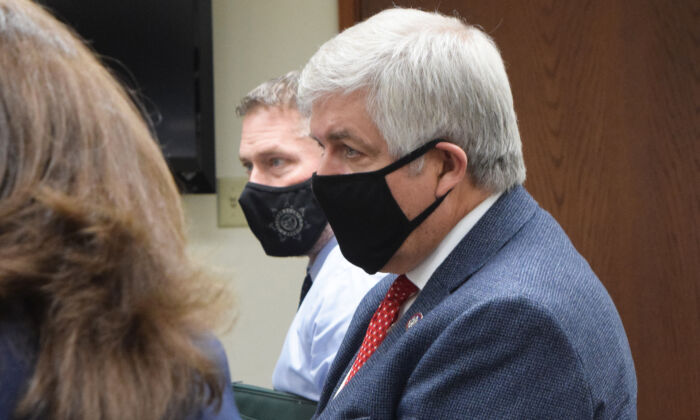Results 1 to 1 of 1
Thread Information
Users Browsing this Thread
There are currently 1 users browsing this thread. (0 members and 1 guests)
-
11-16-2021, 07:31 PM #1
Oregon Pleads for Federal Help to Combat Drug Cartels

Congressman Cliff Bentz held a series of town hall meetings, followed by a roundtable workshop focused on narco slavery and illegal marijuana production in southern Oregon, on Nov. 10, 2021. (Scottie Barnes/The Epoch Times)
REGIONAL NEWS
Oregon Pleads for Federal Help to Combat Drug Cartels
By Scottie Barnes
November 16, 2021 Updated: November 16, 2021
Rooting out the international drug cartels and narco slavery associated with illegal marijuana production in southern Oregon will require “all hands on deck,” according to law enforcement and elected leaders who participated in a Nov. 10 roundtable convened by Rep. Cliff Bentz (R-Ore.), in Medford, Oregon.
Inadequate regulation, open borders, and the lure of boundless amounts of cash are contributing to a wild-west atmosphere in the predominantly rural areas, participants reported.
“There’s a lot of frustration and a lot of fear, and a lot of people are getting hurt,” Bentz said during the meeting. “We need to get in here and do something about it.”
Already, Jackson county has declared a state of emergency as cartels have stolen water, intimidated residents, and enslaved more than 10,000 illegal migrants, who are reportedly pressed into service under threats to their lives or those of their families back home.
Worse yet are emerging allegations that some people have been tortured and others executed.
“This is a humanitarian disaster taking place in plain sight,” Bentz said. “People just can’t ignore it.”
 During a raid on Oct. 8, 2021, local law enforcement seized and destroyed 445 marijuana plants and about 100 pounds of processed marijuana and arrested Litan Dobrinov (L) and Radoslav Nikolov (R) of Bulgaria. This small bust is indicative of the international complexion of the illegal marijuana industry in Oregon. (Courtesy of Josephine County Mugshots)Bentz called the meeting in his home district just days after writing to Attorney General Merrick Garland to ask for federal help.
During a raid on Oct. 8, 2021, local law enforcement seized and destroyed 445 marijuana plants and about 100 pounds of processed marijuana and arrested Litan Dobrinov (L) and Radoslav Nikolov (R) of Bulgaria. This small bust is indicative of the international complexion of the illegal marijuana industry in Oregon. (Courtesy of Josephine County Mugshots)Bentz called the meeting in his home district just days after writing to Attorney General Merrick Garland to ask for federal help.
In that letter, provided to The Epoch Times, the congressman asked the attorney general to direct the FBI and DEA to provide additional resources to Jackson, Josephine, Douglas, and Klamath counties in Oregon. Specifically, he requested teams of up to 20 people be sent to each.
Already the request has drawn the attention of the Department of Homeland Security, which is planning a fact-finding trip in late November.
“They stand ready to do whatever they can as fast as they can,” Bentz said.
He sat down with local leaders to get more details about what they need in a region under siege.
“We brought this issue to the nation’s attention very quickly. Now what do you need us to do?” he asked participants, including Jackson County Sheriff Nathan Sickler, Medford Mayor Randy Sparacino, Jackson County Commissioner Rick Dyer, and state Reps. Kim Wallan and Lily Morgan.
“We need federal help, and we can’t wait for next year,” Morgan said.
Rather than just cultivating from May to October—the prime growing season for outdoor cannabis—growers now operate year-round, producing three or four harvests each year, she said, and law enforcement is overwhelmed.
Morgan said the FBI needs to help local law enforcement investigate financial connections, along with human trafficking and involuntary servitude.
The U.S. Department of Agriculture needs to regulate hemp-derived intoxicants such as CBD, she said. That would require revisions to the 2018 farm bill, which allows for the legal production of hemp but doesn’t include adequate enforcement or regulation.
 International criminal organizations are illegally growing marijuana on an industrial scale in southern Oregon. (Courtesy of Josephine County Sheriff’s Office)“Oregon has issued hemp licenses since 2015, but there wasn’t an inspector on the ground until 2020,” Morgan said. “The [bill] legalizing the production of hemp did not contemplate intoxicating hemp products entering the general marketplace.”
International criminal organizations are illegally growing marijuana on an industrial scale in southern Oregon. (Courtesy of Josephine County Sheriff’s Office)“Oregon has issued hemp licenses since 2015, but there wasn’t an inspector on the ground until 2020,” Morgan said. “The [bill] legalizing the production of hemp did not contemplate intoxicating hemp products entering the general marketplace.”
International criminal cartels are using legal hemp farm operations as cover for growing illegal marijuana. Oregon Health Authority reports that nearly half of the registered hemp farms inspected in the state are doing so.
“Many operations will intersperse the marijuana plants in a field of hemp,” Josephine County Sheriff Dave Daniel told The Epoch Times. “When the grow is done, they harvest the illegal marijuana and let the hemp rot.”
Registered hemp farms won’t allow state inspectors in, and there’s nothing law enforcement can do.
Roundtable participants also urged the federal government to follow the money.
“We have violence related to the transfer of money,” Morgan said.
“We’ve seized millions of dollars in cash and it’s not taxed or accounted for, and that’s just the money we’ve seized,” said Sickler, who suggested that the “IRS find out where these millions of dollars are going.”
As a “critical drug-trafficking region,” Oregon also needs the “aggressive enforcement” activities provided under the federal High Intensity Drug Trafficking Areas (HIDTA) program, Morgan said.
That program enables partnerships between local law enforcement and federal drug enforcement. It’s already proven its worth in southern Oregon.
An Aug. 17 collaboration with HIDTA led to a large raid in which about 250 law enforcement officers from more than a dozen state, local, and federal agencies served a search warrant at a suspected grow. That search uncovered approximately 200,000 plants in 400 greenhouses, spread across 1,300 acres. It also revealed the extent of narco slavery, with nearly 300 workers living in squalid conditions on-site.
“With that kind of help, we can get a handle on this problem, but it will take a while,” said Daniel, who spearheaded the investigation.
“We also need the U.S. Attorney on board,” Sickler said. “We can arrest as many people as we want, but if there’s no prosecution, it doesn’t matter.”
The complex situation requires triage, according to Dyer.
“Nobody has any illusions that we’ll completely eradicate this problem in a year,” he said. “But we can start to make a difference.”
Meanwhile, the group will continue to press the state of Oregon for more resources. The governor’s office is already considering taking action during a February special session.
“We can’t wait for February,” said Sparacino. “We’ve already kicked this can down the road for too long.”
Oregon Pleads for Federal Help to Combat Drug Cartels (theepochtimes.com)If you're gonna fight, fight like you're the third monkey on the ramp to Noah's Ark... and brother its starting to rain. Join our efforts to Secure America's Borders and End Illegal Immigration by Joining ALIPAC's E-Mail Alerts network (CLICK HERE)
Similar Threads
-
Drug cartels in Oregon: Violence in the Northwest
By kathyet2 in forum General DiscussionReplies: 0Last Post: 06-26-2013, 01:44 PM -
Border patrol moves focus to Texas to combat Mexican drug cartels
By JohnDoe2 in forum illegal immigration News Stories & ReportsReplies: 0Last Post: 03-14-2013, 02:48 PM -
Department of Justice Efforts to Combat Mexican Drug Cartels
By JohnDoe2 in forum illegal immigration News Stories & ReportsReplies: 0Last Post: 04-03-2009, 02:47 PM -
US Prepares to Target and Combat Mexican Drug Cartels
By Copguy in forum illegal immigration News Stories & ReportsReplies: 0Last Post: 03-25-2009, 07:17 AM -
ICE Asks to Divert Enforcement Funds to Combat Drug Cartels
By Texas2step in forum illegal immigration News Stories & ReportsReplies: 3Last Post: 03-20-2009, 06:08 PM


 LinkBack URL
LinkBack URL About LinkBacks
About LinkBacks




 Reply With Quote
Reply With Quote


Oklahoma House passes bill making illegal immigration a state...
04-19-2024, 05:14 AM in illegal immigration News Stories & Reports